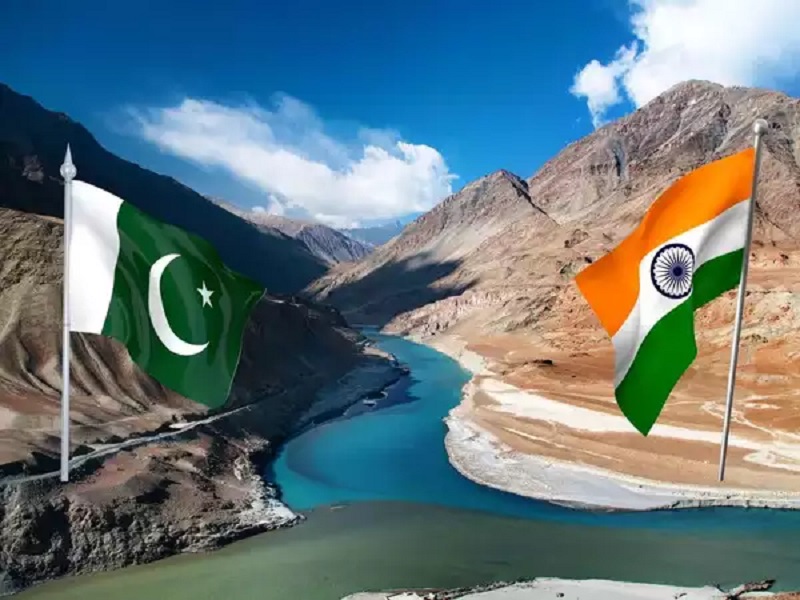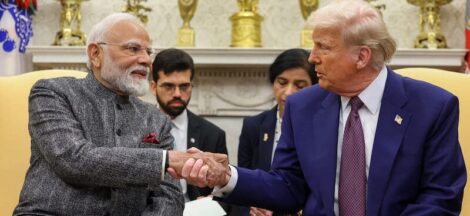By Sant Kumar Sharma
On April 23, 2025, the Cabinet Committee on Security (CCS), which was presided over by Prime Minister Narendra Modi, decided to keep the Indus Waters Treaty (IWT) in abeyance. It bears mention here that the word abeyance is not used anywhere in the Treaty text. As such, the Pakistani leaders are correct when they claim that it has no legal backing. Well, this is something they have to now deal with, legal or otherwise, and face the consequences of this decision.
Most Pakistanis term the decision as an existential threat since an agrarian society’s dependence on irrigation water is foundational. The possibilities opening up with India’s announcement is what worries Pakistan as hell because this is uncharted territory. India has paused bombardments on Pakistani targets, be it military or terrorist camps, but refused to reverse its decision on the IWT.
The first impact the decision had in Pakistan was that Prime Minister Shehbaz Sharif conceded defeat before Bilawal Zardari Bhutto on April 29 as he announced stoppage of all work on new Indus canals. This was a stinging slap for Pakistan Army Chief General Asim Munir who had inaugurated this project along with Punjab Chief Minister Maryam Nawaz on February 15, 2025.
Be it scholars, lawyers or politicians, all Pakistanis argue that there is no provision for unilateral abeyance of the Treaty. On this basis, all of them have termed India’s action with regard to the Treaty as illegal and lacking the force of law.
It bears mention here that there indeed is no provision for keeping the Treaty in abeyance in any of the 12 Articles and eight appendices. Under Article XII, called Final Provisions, the Treaty can be modified from “time to time’’. Article XII, Final Provisions is being reproduced hereunder in full. It says: (1) This Treaty consists of the Preamble, the Articles hereof and Annexures A to H hereto, and may be cited as “The Indus Waters Treaty 1960”. (2) This Treaty shall be ratified and the ratifications thereof shall be exchanged in New Delhi.
It shall enter into force upon the exchange, of ratifications, and will then take effect retrospectively from the first of April 1960. (3)The provisions of this Treaty may from time to time be modified by a duly ratified treaty concluded for that purpose between the two Governments. (4) The provisions of this Treaty, or, the provisions of this Treaty as modified under the provisions of Paragraph (3), shall continue in force until terminated by a duly ratified treaty concluded for that purpose between the two Governments.
This Article XII was invoked by India, for the first time ever, on January 25, 2023, and Pakistan did not respond in the manner India expected or wanted it to. It refused to start fresh negotiations for modification of the Treaty, under this provision.
Can it not be said then that Pakistan was “unilaterally’’ nullifying Article XII of the Treaty? It has been done by Pakistan twice already as it refused to start negotiations on even second notice served by India under Article XII on August 30, 2024. Some more notices may have been give to Pakistan in the interim though much is not there in the public domain.
Is refusal to adhere to Article XII of the Treaty an adherence to its essence? Or is it a contradiction of the spirit of Treaty.
The IWT was signed by Indian Prime Minister Pandit Jawaharlal Nehru and Pakistani President Ayub Khan on September 19, 1960, in Karachi in presence of World Bank officials. It endured for almost 65 years and Pakistan built a narrative that even wars had failed to shake it up. Misplaced do-gooders from India tagged along, and praised it sky high, as an unshakable talisman of cooperation between the two neighbours, often bitter rivals, and enemies.
The Indian government under Atal Behari Vajpayee talked of the possibility of scrapping the Treaty after December 13, 2001, attack on Parliament by Lashkar e Toiba (LeT) terrorists. Somehow, the threat was not carried out and two years before that, during Kargil war, it was not something that was on the table even for discussions.
On April 23, 2025, almost 65 years later, PM Modi has done to IWT after the Pahalgam terror killings what earlier wars could not do. Keeping IWT in abeyance was the first of five major punitive steps that the Modi government has initiated against Pakistan to go after it. Indian Foreign Secretary Vikram Misri announced the CCS decisions which made it clear that retaliation has been swift and severely punitive.
Keeping the IWT in abeyance is a real knock-out punch that Modi has delivered to our western adversary.
The very first step regarding which Foreign Secretary Vikram Misri made announcement was regarding Indus Waters Treaty. He said: Recognising the seriousness of this terrorist attack, the Cabinet Committee on Security (CCS) decided upon the following measures. The next sentence reads: The Indus Waters Treaty (IWT) will be held in abeyance with immediate effect until Pakistan credibly and irrevocably abjures its support for cross-border terrorism.
Will anything change for Pakistan by suspending the IWT immediately? Well, this announcement gives a huge psychological shock to Pakistan even if it keeps a brave face for some time. Deputy Prime Minister and Foreign Minister Ishaq Dar has clearly enunciated Pakistan’s position clearly when he says that they cannot think of a situation in which IWT is not restored.
Some political and military leaders of Pakistan have said that stopping the river flows to their country would be considered as an act of war. Not that these threatening words or postures have intimidated anyone in India. They don’t seem to have impacted anyone in Delhi to tone down the rhetoric or roll back the decision to keep the Treaty in abeyance.
India has stopped all data pertaining to river flows with Pakistan immediately and this data from 280 stations is of immense value to it. There are many other things that will now follow, with the Treaty in abeyance. (IPA Service)




 Pakistan Army: Unmatched Expertise In Art Of Deception
Pakistan Army: Unmatched Expertise In Art Of Deception 